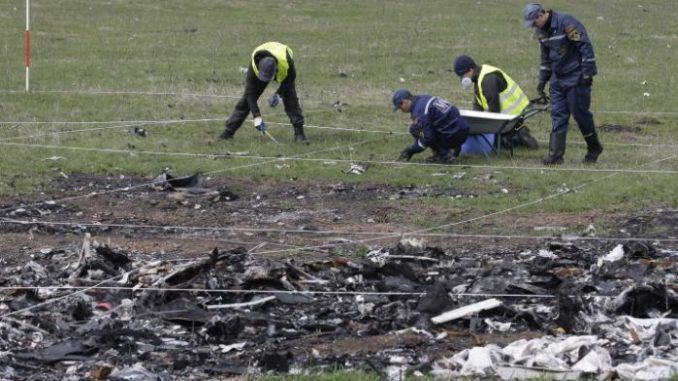
Investigators in the Netherlands have claimed to have found fragments of a Russian missile system at the MH17 crash site in Ukraine.
The investigators say that parts of a Buk surface-to-air system may prove who was responsible for the crash.
BBC News reports:

BYPASS THE CENSORS
Sign up to get unfiltered news delivered straight to your inbox.
You can unsubscribe any time. By subscribing you agree to our Terms of Use
But they say they have not proved their “causal connection” with the crash.
MH17 crashed on land held by Russian-backed rebels in July 2014, killing all 298 on board.
There were 283 passengers, including 80 children, and 15 crew members on the Malaysian Airlines airliner.
About two-thirds of those who died were Dutch nationals, with dozens of Malaysians and Australians among the rest.
Ukraine and many Western countries have accused pro-Russian rebels of shooting down the plane, saying they could have used a Buk missile system supplied by Russia.
Russia and the rebels deny any responsibility and say the Ukrainian military was to blame.
The Joint Investigation Team (JIT) said in a joint statement with the Dutch Safety Board that the parts had been “secured during a previous recovery mission in eastern Ukraine”.
“The parts are of particular interest to the criminal investigation as they can possibly provide more information about who was involved in the crash of MH17. For that reason the JIT further investigates the origin of these parts,” the statement said.
Fred Westerbeke, a spokesman for the Dutch Prosecutor’s Office, said that seven fragments had been found which were definitely not part of the aircraft, and further investigations had shown that they were probably from a missile system.
“We are going to need more investigation to really find out what exactly this is and if it is part of a possible system that took down MH17,” he added.
“If we can establish that, then we can say that it is a breakthrough.”
Analysis: By Jonathan Marcus, BBC defence and diplomatic correspondent
The Dutch safety board is characteristically cautious. For now it is insisting that no causal connection can be established between the discovered parts and the crash.
The aircraft is widely believed to have been downed by a surface-to-air missile. Indeed the investigators’ preliminary report – released last September – noted that the damage to the aircraft’s fuselage and cockpit indicated impacts from a large number of high-energy objects from outside the aircraft; consistent with an engagement by a Buk-type missile.
The crucial question remains who fired the weapon – Russian-backed separatists or even the Russian military itself? The Ukrainians also operate a variant of the Buk system.
The missile parts could be a help here but satellite intelligence may provide more of the picture. Independent investigators have already established a video trail which appears to place a Buk launcher in the crash area on the day in question.
The investigators would now enlist the help of weapons experts and forensic specialists to examine the parts, the statement added.
The JIT comprises representatives of the Netherlands, Ukraine, Belgium, Malaysia and Australia.
They are meeting in The Hague to discuss a draft report on the causes of the crash, the final version of which is expected to be published by the Dutch Safety Board in October.
The statement comes two weeks after Russia vetoed a draft resolution to set up an international tribunal into the disaster, triggering widespread outrage.
Moscow described the Malaysian initiative as “premature” and “counterproductive”.
The Boeing 777 was flying from Amsterdam to Kuala Lumpur when it was brought down on 17 July last year in Donetsk region.


